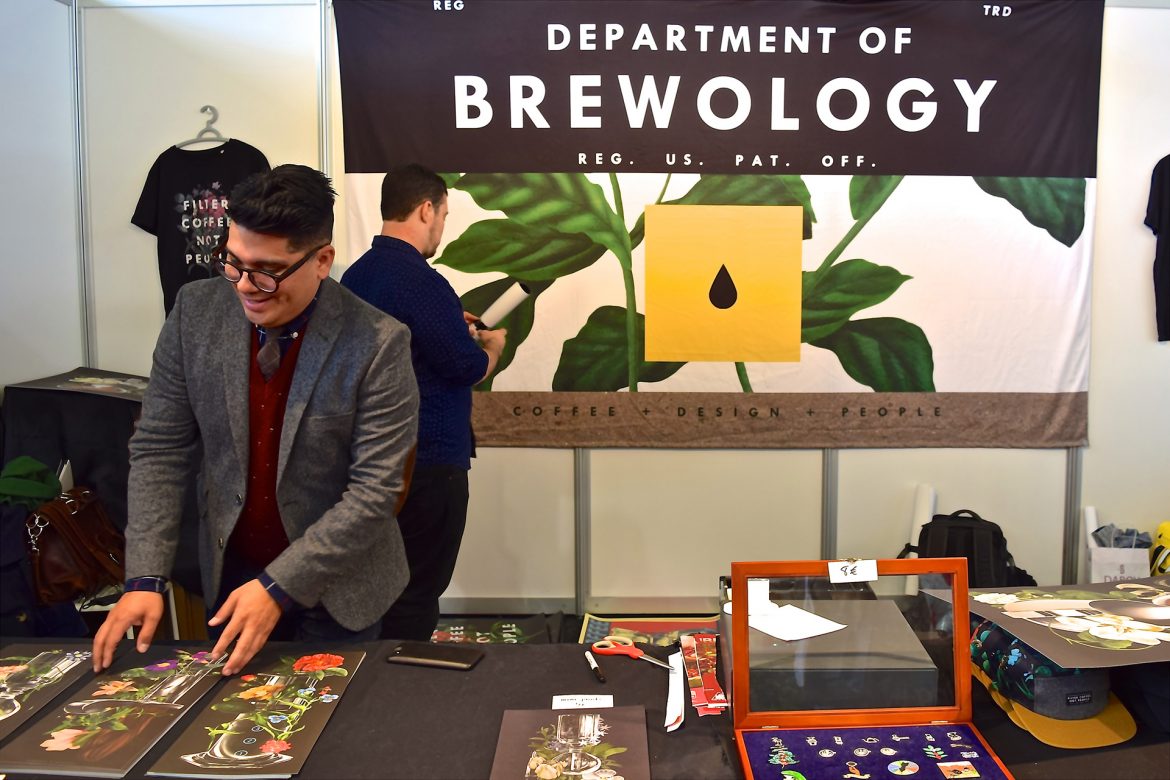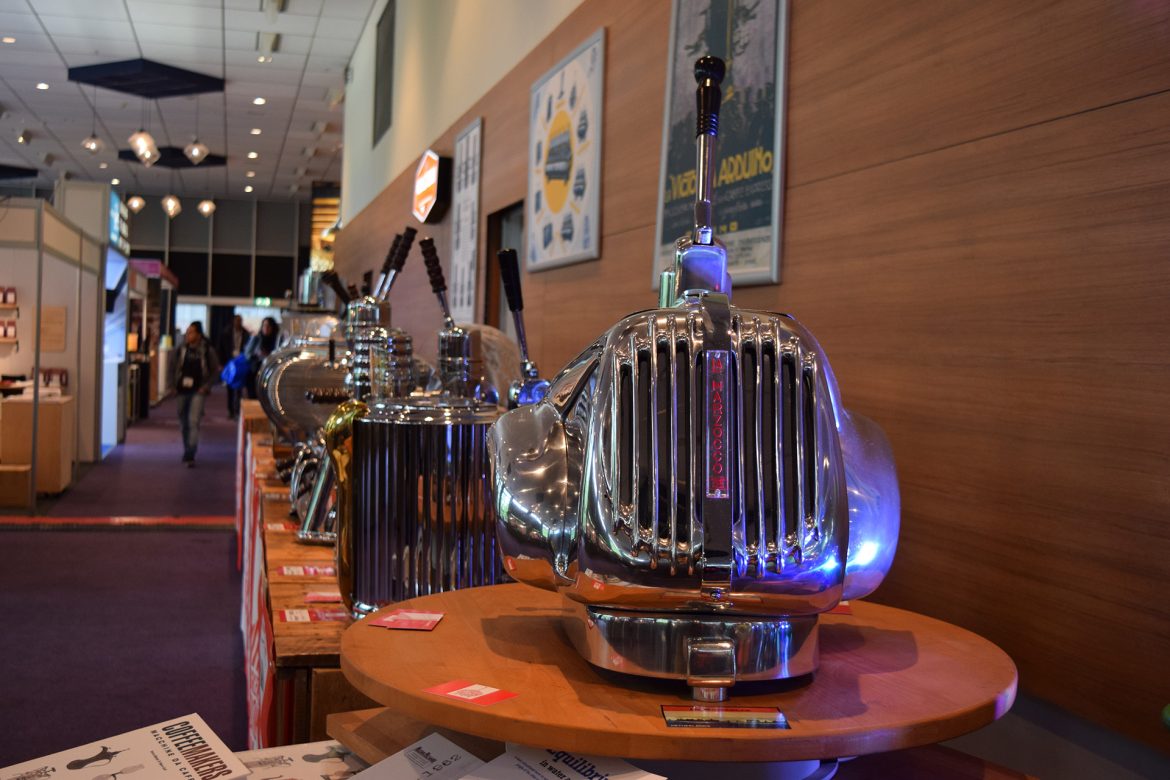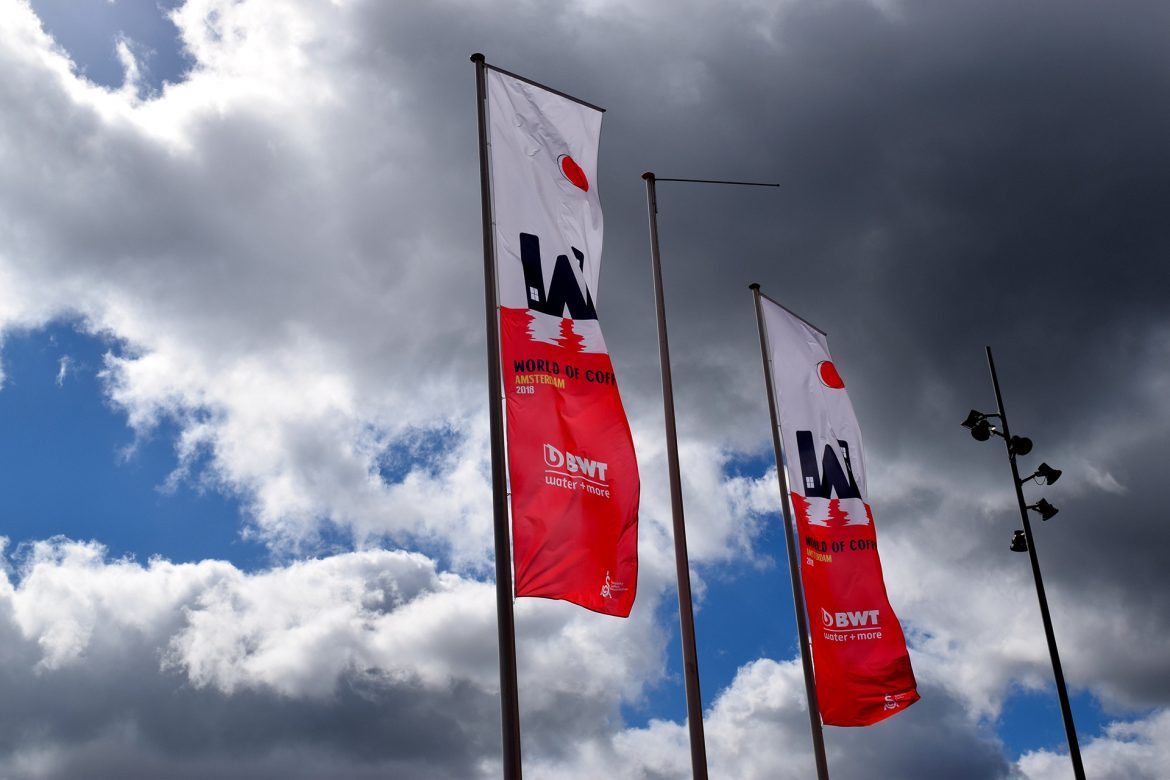
Dutch winds blew chilly outside World of Coffee 2018, but inside, at the Amsterdam RAI convention center, June 20th to 23rd were hot-ticket days.
Breaking records this year, nearly 11,000 professionals registered for WOC, according to its organizing body, the Specialty Coffee Association. At a pre-ribbon-cutting press conference prior to the trade show’s official opening, SCA chief events officer Cindy Cohn cited a presence of 271 exhibitors and called it “the best-looking event we’ve put on.” Later, on the competition floor, Agnieszka Rojewska from Poland made history by becoming the first woman in the contest’s 18-year existence to win the title of World Barista Champion.
Visitors to Amsterdam sometimes joke that they can’t remember much from their trips to the famously live-and-let-live city, but these five WOC booths proved unforgettable.
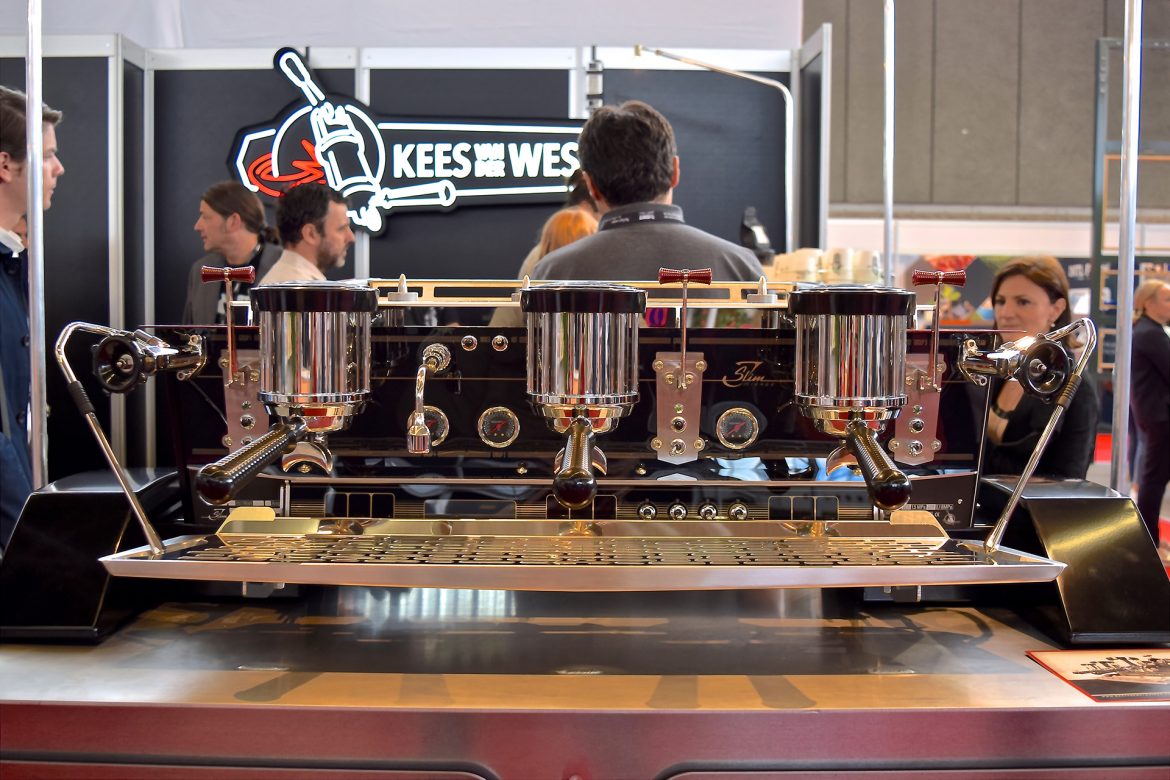
Kees van der Westen
Nothing lights up a Dutch coffee event like the indigenous splendor of the Kees van der Westen brand, and everybody, from everywhere, was getting revved-up to see the debut of the Mirage Slim Jim. Presaged in a 2016 Sprudge interview with Kees van der Westen himself, this new espresso machine is “kind of a mixture” between others in the existing seQries, explained Yvette van der Westen, who oversees marketing for the company that her father heads. “Technically, visually, and price-wise, it will offer users an experience that falls somewhere between the Mirage and the Spirit.”
Unlike the Mirage, the Mirage Slim Jim is a multiple-boiler machine. Available in a Douette or a Triplette configuration, the groups have been given plenty of love and attention, each having its own two-stage progressive pre-infusion cylinder, a shot timer, a thermometer, and a pressure gauge. Other features include a dual hot water temperature knob and a dual volumetric lever.
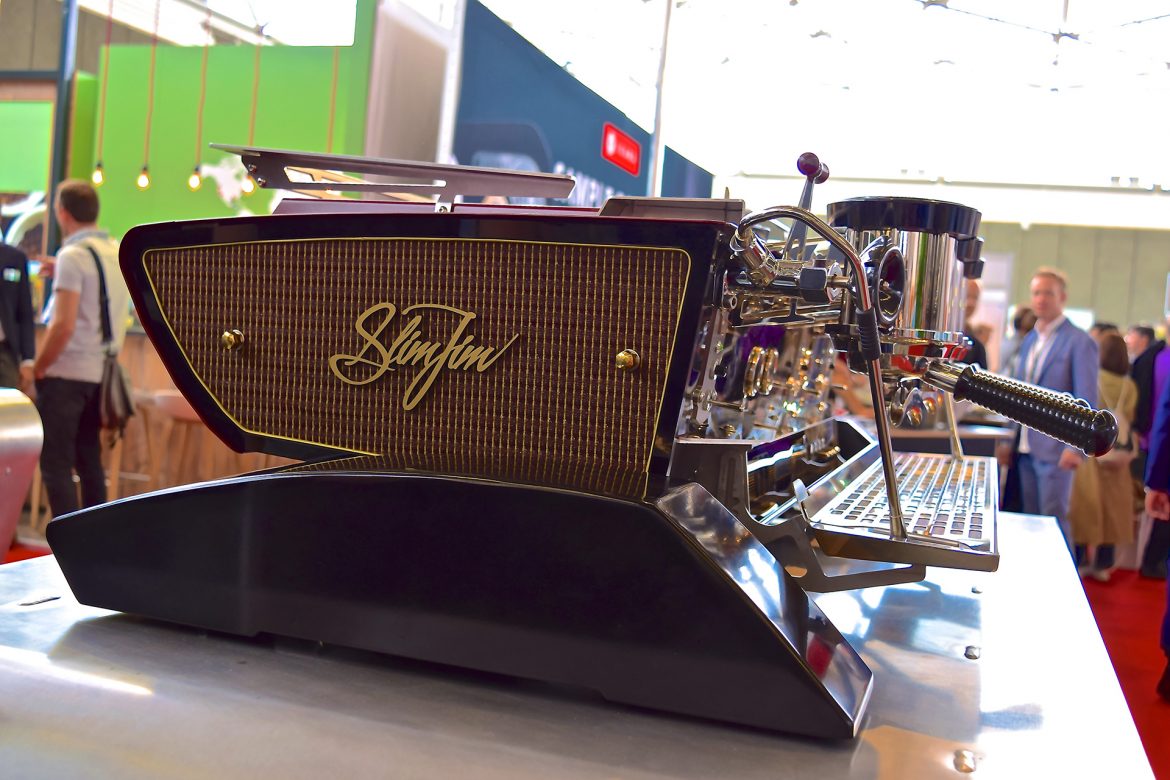
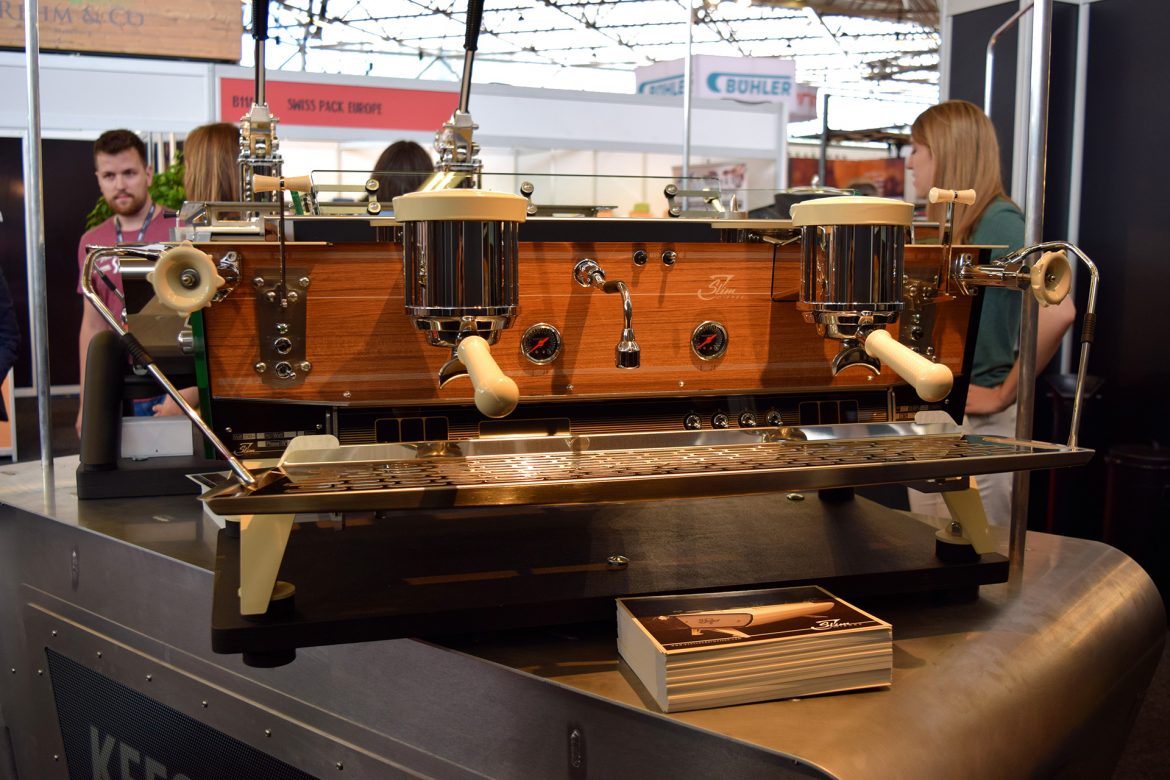
The Slim Jim Idrocompresso model shares many of the same specs as the standard Slim Jim, but its prominent lever group cylinders have been built to be fully encased in hot water. This produces “a water cushioning effect which takes off a bit of the pressure and it won’t hit you in the face,” said Yvette, explaining that the lever on previous Idrocompresso models was susceptible to shooting up if a barista forgot to load the portafilter.
All four prototypes showed unique details, including interchangeable legs, front and side panels, cup rails, awnings, and knobs, plus various colors and room for customized logos. Still, they all shared a nostalgic Americana automotive design sensibility, so much so that baristas might start pulling out their Pomade and poodle skirts.
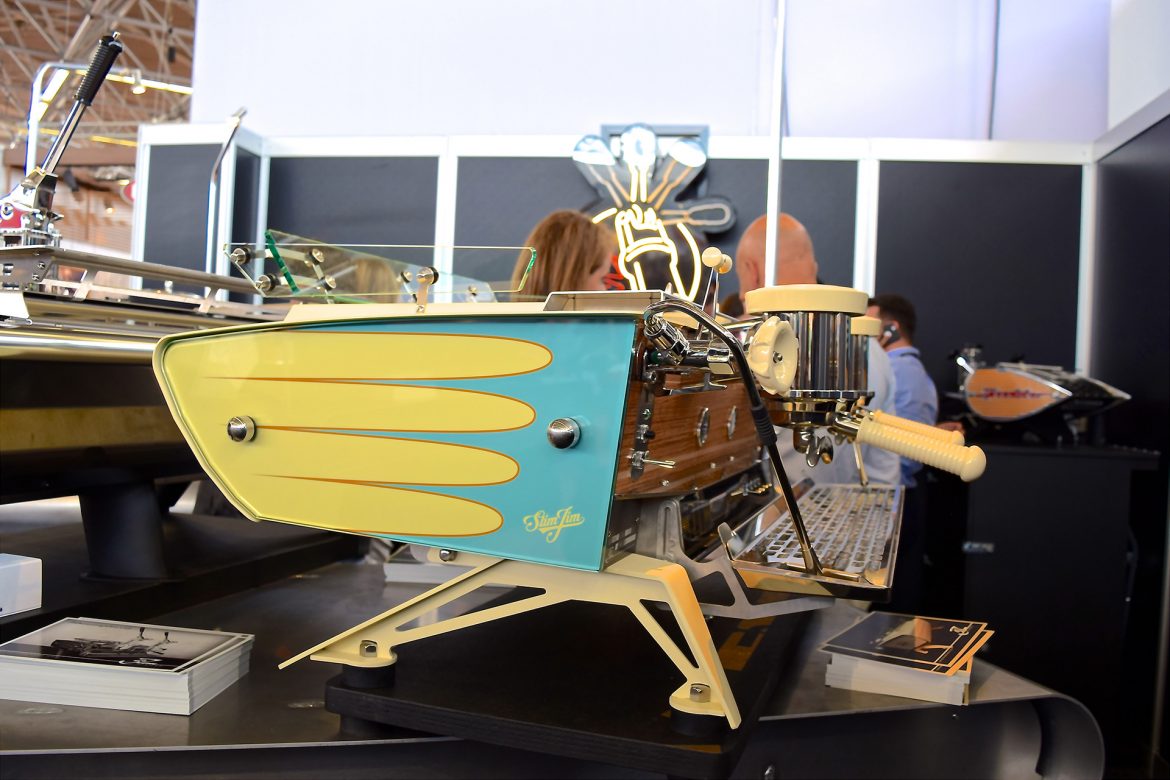
Following WOC, the Van der Westen family—all members showed up, including Yvette’s two sisters, now also her colleagues—were due to cruise back to headquarters in Waalre. Their road map foresees a few more technical tweaks, a pre-production series, and finally, the Mirage Slim Jim’s availability by early 2019.
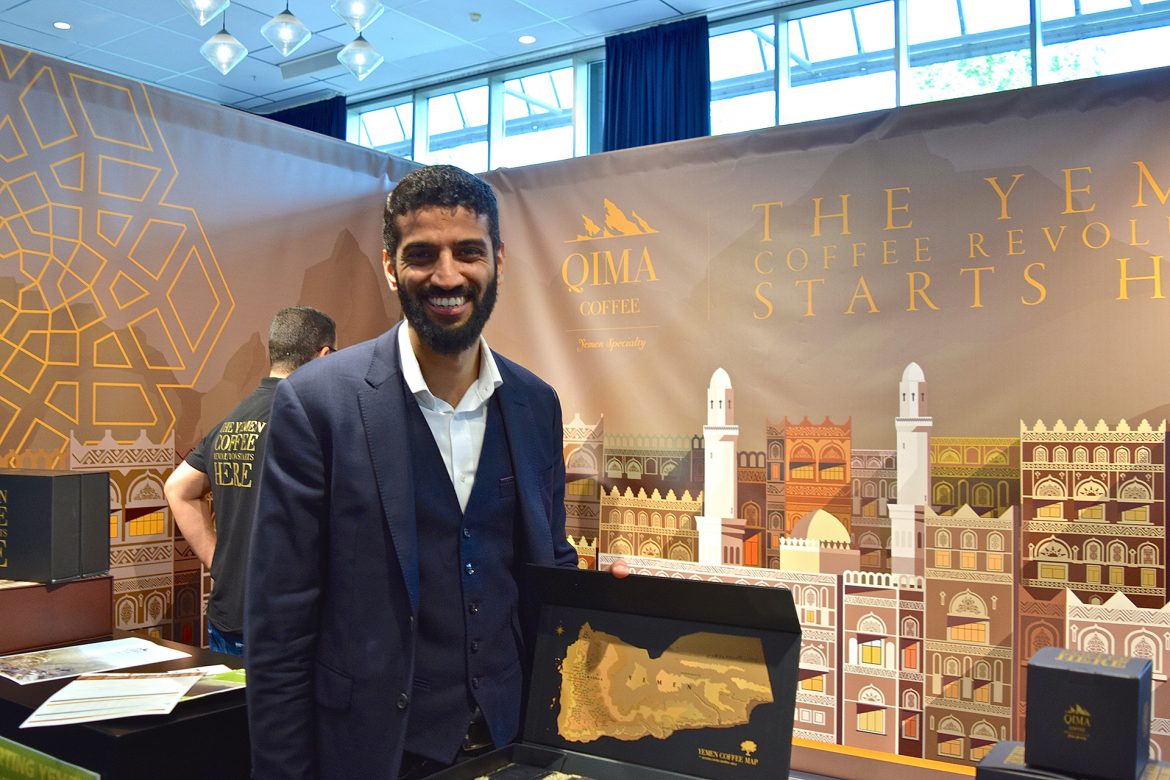
Qima Coffee
At WOC Amsterdam, the launch of Qima Coffee, a London-headquartered company sourcing specialty beans from Yemen, was bittersweet. “The Yemen Coffee Revolution Starts Here” read the slogan on the stand’s backdrop, a lively mocha- and gold-toned illustration of Sana’a’s ancient skyline. Helping lead that revolution is Faris Sheibani, a UK-born Yemeni who founded Qima in late 2016, seeking to do something for his parents’ country of origin, where civil war has killed, wounded, and displaced thousands of people since early 2015.
Booth-side, Sheibani and colleagues warmly received visitors, telling them about Qima’s debut collection. Some 800 smallholder farmers across northern and central Yemen produced about 250 coffee lots, which were cupped and scored by Dutchman-gone-Californian Willem Boot of Boot Coffee. For the expo, Cafe Keppler co-owner Kees Kraakman roasted sample beans and praised Sheibani, a former SCA course student of his, for “how he combines a moral cause with a commercial enterprise.” Some farmers can now earn 20 times more income working for Qima, said Brahim Boukadid, Qima’s commercial manager in the Netherlands. He reported that 10% of profits get reinvested in the farmers’ villages, supporting agriculture and education projects, though above all, he emphasized: “We want to give them hope with this coffee.”
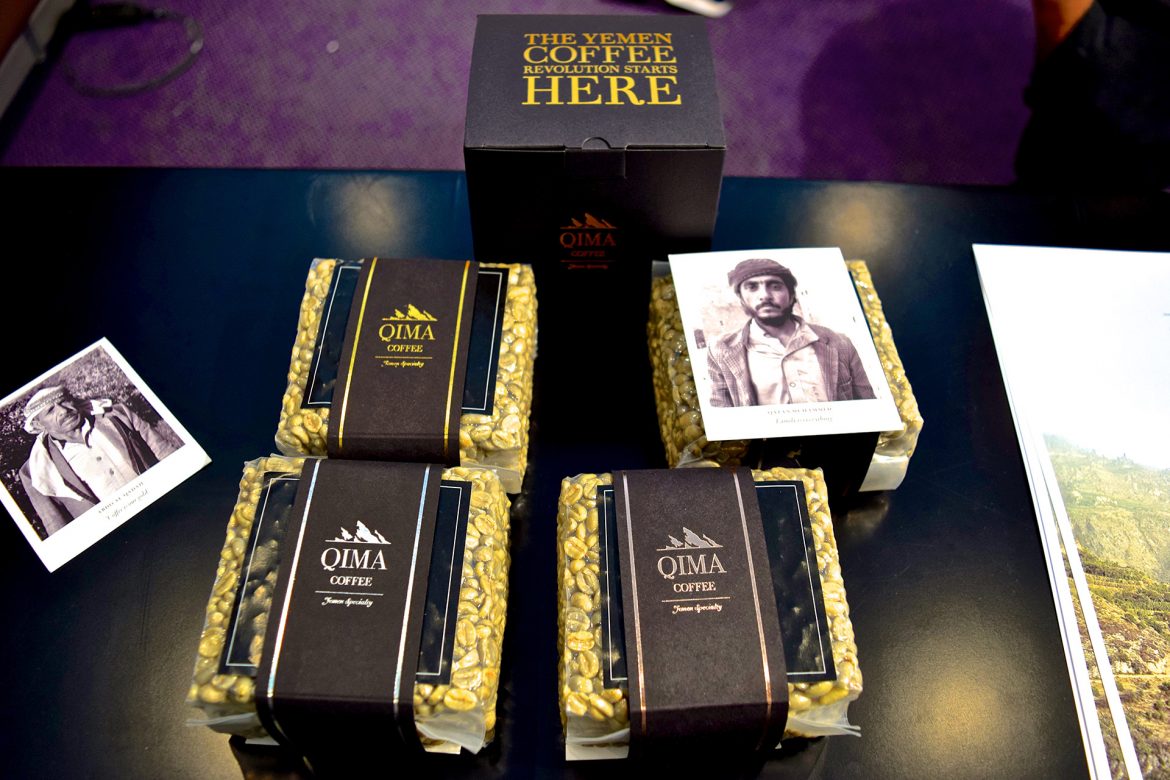
Attendees showed avid interest in Qima, suggesting its commercial prospects in Europe are real. Those glimmers of hope, however, were overshadowed by a conspicuous absence: that of four Yemeni farmers and a Yemeni NGO worker who were expected to be part of the company’s Amsterdam delegation. Their visa requests to visit the Netherlands were denied twice after what Sheibani described in an impassioned video message as an arduous, time-consuming, and humiliating application process filed via the Dutch embassy in Amman, Jordan. The visa denial made headlines and generated social media posts hashtagged #freeourfarmers. Qima has been outspoken about the decision’s unjustness and its irony. In the same video, Sheibani stated: “The Dutch East India Company took—smuggled—seedlings from Yemen, coffee seedlings from Yemen, to Amsterdam to plant them in the botanical gardens in Amsterdam, illegally. Four hundred two years later, we wanted to legally… together with the Dutch, celebrate coffee culture.” Qima has since published a follow-up video, captioned as a “message of hope and coexistence from the farmers of Yemen to the people of the Netherlands and the world!”
At the time of writing, three of the farmers remain in Amman, Sheibani told Sprudge in an email shortly after he returned to the UK. He said that he is helping the farmers apply to other global coffee exhibitions so they can personally represent their coffees. “If they go back empty-handed, it would be a devastating blow to thousands of farmers following the events from Yemen and a significant setback to the Yemeni coffee industry in general,” wrote Sheibani. (For the latest news, follow Qima on Facebook.)
Department of Brewology
It was a sight for sore eyes and some salve for the soul to spot the Department of Brewology making their WOC debut. The dauntless design duo from Austin, Texas, was selling wearables and wall art featuring their Filter Coffee Not People slogan, among others.
“It’s been great, actually. We love coming to Europe,” said company operations manager Brett Cannon, when asked their reception outside the US. New items on show included two coffee blossom pins and mini-prints of their iconic illustrations commingling botanicals and barista tools. Company designer David Salinas also told Sprudge about a new campaign, expected to launch in the coming months. For it, the Department of Brewology is working with The Lucy Foundation, a New Zealand-based organization promoting greater visibility of people with disabilities in the coffee industry. In the same spirit that sees proceeds of the FCNP T-shirt going to the Refugee Services of Texas, the new initiative will help raise funds for The Lucy Foundation. These designs are a collaboration between Floridian illustrator Anna Coleman and Salinas, and will be anchored by their own slogan. Those words are not yet public, but the campaign is geared “to really advocate for coffees that do good as opposed to just coffees that taste good,” said Salinas.
Collezione Henk Langkemper
Not a booth but a veritable buffet table, the Collezione Henk Langkemper snaked its way along one side of the trade floor’s food court. On show were 25 vintage espresso machines and grinders manufactured between 1936 and 1972, and now belonging to Dutch coffee industry vet Henk Langkemper. His entire 110-piece collection of such relics is usually at Espresso Service West, his three-decade-old coffee import and distribution company in The Hague that has become synonymous with supporting Dutch baristas in national and world competitions.
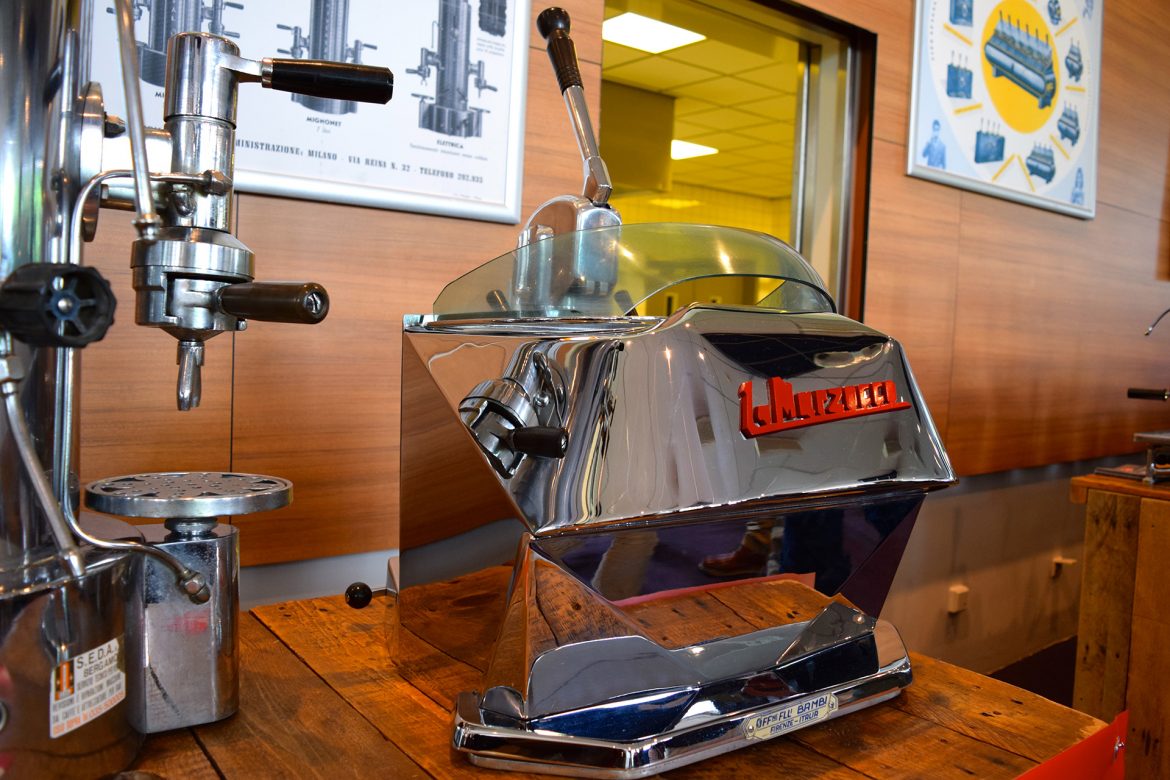
Asked for his most cherished, Langkemper pointed to what he called “any collector’s favorite:” the Rondine, described as the first La Marzocco one-group ever made, in 1953. The journey to get the machines to Amsterdam was tumultuous, said their owner: the idea began hatching at last year’s WOC Budapest, was slowed down by uncertainty about where on the expo floor the display could be accommodated, got called off after Langkemper had a heart attack in November, and then by February, reignited when an ESW customer pledged to provide the display bars. Before long, friends of Langkemper, from Seattle to Hong Kong, pitched in to help restore the machines. And so there they—and their owner—stood, back in shiny working condition.
Coffee Pixels
Winning this year’s Best New Product Competition in the category of food was Coffee Pixels Cascara, one of two edible coffee bars being sold by Latvian cousins Raivis, Andris, and Gundars Vaitekuns. Former specialty cafe owners in Riga, the trio today forms the company Solid Coffee, which started producing Coffee Pixels in 2017. Raivis described it as an idea born from necessity or, more precisely, withdrawal while traveling. Recounting instances when gas station or airplane coffee was their only option, he said they asked themselves “how we can take the quality of experience and the values that we have in specialty coffee truly on the go.”
The 10-gram bars are made from cocoa butter, Ethiopian coffee, coffee cherries, sugar, and salt. The “Milk” version contains 33 milligrams of caffeine and the winning “Cascara” contains 50 milligrams, the equivalent of approximately 30 milliliters of espresso. Sourced by Panama Varietals, the cascara comes from Nicaragua, and its choice as an ingredient reflects “the other part of the drive to build this product,” said Raivis, which is “to really tackle the waste produced in the coffee industry.”
Raivis, Andris, and Gundars Vaitekuns, founders of Coffee Pixels.
Another edible coffee benefit is that it “will be micro-dosing itself within your body,” he said. Because the caffeine is in saturated fat, it takes longer for the body to absorb, with its effect lasting up to four hours, Raivis estimated. He also pointed out that cascara contains antioxidants, so “this clean boost” accompanies the caffeine kick. “It feels like you have more energy in the head.”
And no wonder WOC Amsterdam was full of superlative highs and yet, still so memorable.
Karina Hof is a Sprudge staff writer based in Amsterdam. Read more Karina Hof on Sprudge.
The post Booth Beat: Our 5 Favorite Booths From World Of Coffee Amsterdam appeared first on Sprudge.


